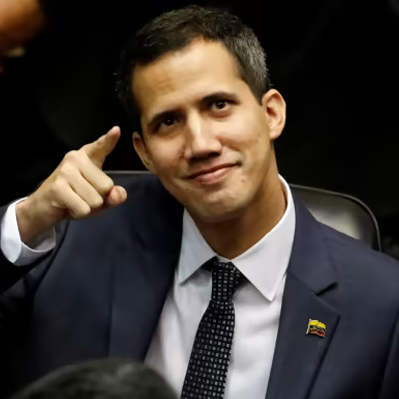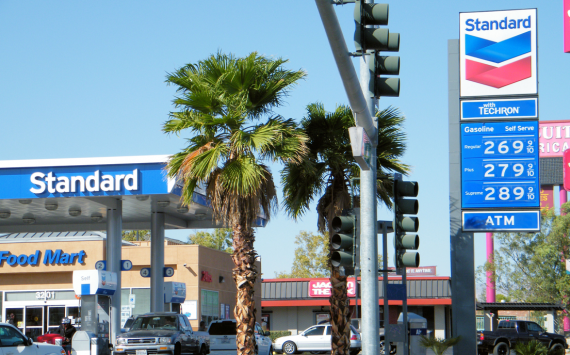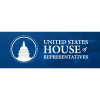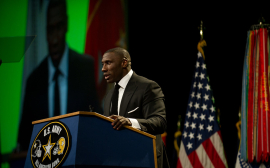Juan Gerardo Guaidó Márquez is a Venezuelan politician, a former member of the social-democratic Popular Will party, and federal deputy to the National Assembly representing the state of Vargas. On 23 January 2019, Guaidó and the National Assembly declared he was acting president of Venezuela (Spanish: Presidente encargado de Venezuela), starting the Venezuelan presidential crisis by challenging Nicolás Maduro's presidency.
Guaidó's political career began when he emerged as a student leader in the 2007 Venezuelan protests. He then helped found the Popular Will party with Leopoldo López in 2009, and was elected to be an alternate deputy in the National Assembly one year later in 2010. In 2015, Guaidó was elected as a full-seat deputy. Following a protocol to annually rotate the position of President of the National Assembly among political parties, Popular Will nominated Guaidó for the position in 2019.
Guaidó has been a key figure in the Venezuelan presidential crisis, which began when the National Assembly, considering the 2018 Venezuelan presidential election illegitimate, refused to recognize the inauguration of Nicolás Maduro to a second presidential term on 10 January 2019. Guaidó announced, on 23 January 2019, that he was formally assuming the role of interim president under Article 233 of the Constitution of Venezuela, with the backing of the National Assembly, until free elections could be held. He has received formal recognition of legitimacy from almost 60 governments worldwide, including the United States, Canada and various Latin American and European countries. Other nations, including Russia, China, Iran, Syria, Cuba and Turkey have continued to recognize Maduro. On 6 January 2021 the European Union stopped recognizing Guaidó as president, without recognizing Maduro as the legitimate president, and threatening further sanctions. As of December 2021 Guaidó had not been able to remove Maduro from power; Maduro remained in control of the military, government institutions, and state enterprises. The Maduro administration has prohibited Guaidó from leaving the country, has frozen his Venezuelan assets, has launched a probe accusing Guaidó of foreign interference, and has threatened violence against him.
On 30 April 2019, Guaidó called for an uprising against Maduro as part of "Operation Freedom", which ultimately failed. Following the failed uprising, representatives of Guaidó and Maduro began mediation, with the assistance of the Norwegian Centre for Conflict Resolution. After the second meeting in Norway, no deal was reached. On 9 July 2019 negotiations started again in Barbados with representatives of Guaidó and Maduro. On 15 September, Guaidó announced that the opposition concluded the dialogue after the absence of the government in the negotiations for forty days as a protest to the recent sanctions by the United States. In January 2020, security forces prevented Guaidó and other congress members from entering the legislative palace during an internal election to choose the board of directors. A majority of lawmakers held an "emergency meeting" in the headquarters of the newspaper El Nacional and voted to re-elect Guaidó as their leader, with a swearing-in ceremony inside the parliament a day later, while the remaining lawmakers at the legislative palace elected Luis Parra. Security forces denied Guaidó and opposition lawmakers access to parliament many times since. In late March 2020, the United States proposed a transitional government that would exclude both Maduro and Guaidó from the presidency. Secretary of State Mike Pompeo said that sanctions did not apply to humanitarian aid during the coronavirus pandemic health emergency and that the United States would lift all sanctions if Maduro agreed to organize elections that did not include himself in a period of six to twelve months. Guaidó accepted the proposal, while Venezuela's foreign minister, Jorge Arreaza, rejected it and declared that only parliamentary elections would take place that year. After the announcement of regional elections in 2021, Guaidó announced a "national salvation agreement" and proposed negotiation with Maduro with a schedule for free and fair elections, with international support and observers, in exchange for lifting international sanctions.
Domestically, Guaidó's actions have included a proposed Plan País (Country Plan), an amnesty law for military personnel and authorities who turn against the Maduro government, attempts to deliver humanitarian aid to the country, and social bonuses for health workers during COVID-19 pandemic. Internationally, Guaidó has gained control of some Venezuelan assets and property in the United States, has had success in a legal battle for control of £1.3 billion of Venezuelan gold reserves in the United Kingdom, and has appointed diplomats recognized by supportive governments.





















































